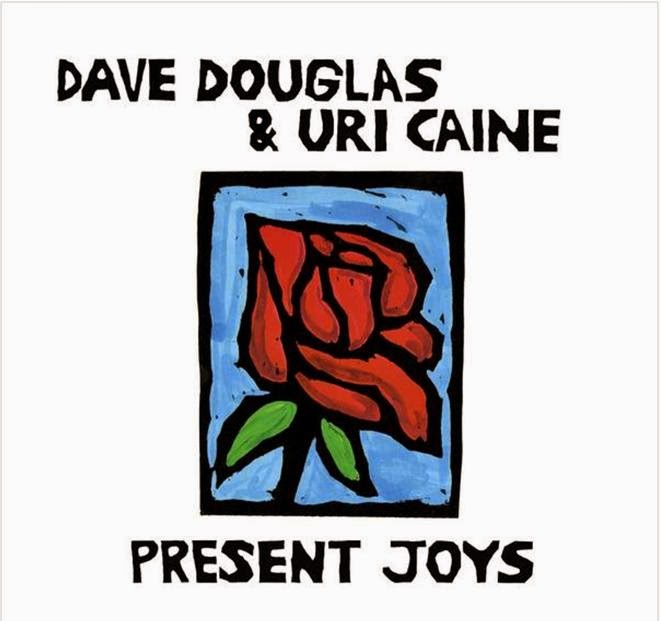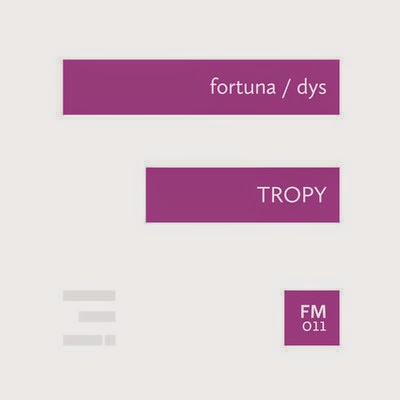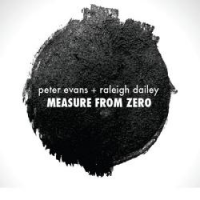By Stef
I like many ensemble formats, and depending on the mood of the day, some get preference over another. When you’re in an atmosphere of quiet introspection, or calm availability, or intellectual sensitivity, the trumpet piano duet is often my preferred listening companion. Often, the technical quality is good, the chamber-like sounds do not force you too much out of your comfort zone, but you’re still open for inventive ear-candy.
If you feel the same from time to time, I can recommend the following three albums, which also – in sequence – bring us from tradition to avant-garde, from jazz over neo-classical to music beyond conventions, and in my opinion, increasing the value of the outcome, from sublime entertaintment, over brilliant aesthetics to real art.
Dave Douglas & Uri Caine – Present Joys (Greenleaf, 2014) ***½
Of course we all know Dave Douglas and Uri Caine, no need to tell who they are. Douglas is jazz personified, and Uri Caine has been the tormentor of classical music into his own fusion idiom, and much more. Both of course have their references with klezmer too, as part of John Zorn’s environment.
Here they bring us their own “present joys”, a very jazzy album in the most traditional sense, with more rounded and finished compositions, based on the “Sacred Harp” tradition, choral music from the south of the United States, which they use as the spring board for own compositions, or for further explorations of the sacred with the very profane bar jazz, and they switch as easily from one to the other, presenting both in a very respectful, playful and sometimes melancholy manner.
Even more, both musicians dive really deep into jazz origins, bluesy, boppish, with walking bass lines, conjuring up the very foundations of why we all like jazz so much, then adding some more contemporary sounds and figures, embedded in the traditional song harmonies.
Maciej Fortuna & Krzysztof Dys – Tropy (ForTune, 2013) ****
The Polish duo of Maciej Fortuna on trumpet and Krzysztof Dys on piano is a real treat. Both are classically trained, and the latter we already mentioned as part of Waclaw Zimpel’s band on “Stone Fog“. The technical quality of their playing is absolutely superb, with Fortuna having an incredible purity of tone, and Dys having the versatility to tackle many challenges and offer subtle beauty. As they say themselves “it’s too classical to be called jazz, and too jazzy to be called classical“, and indeed, they merge both genres as if there was no distinction, shifting in and out of structure, in and out of harmony and rhythm, free to roam where it pleases them.
They offer us a very nice and coherent album, with moments of joy, of intimate melancholy, of playful fun and more exalted jubilations, yet always interesting, always engaging, offering a delicate solidity.
Does Tomasz Stanko come to mind at times? Yes, he does. But to the duo’s credit, they manage to create their own sound, their own space, which is so inviting and welcoming, that no references are needed.
Peter Evans & Raleigh Dailey – Measure From Zero (Llama Records, 2014) ****½
This album was already reviewed earlier by Paul Acquaro, but why not review it twice? It can only offer more insights to the interested reader.
Of the three albums presented here, Peter Evans and Raleigh Dailey offer the most abstract, the most explorarotary outing, and there is no comparison with what Dave Douglas and Uri Caine do, except then for the feelings. Again, there are moments of pure aesthetic beauty, many moments even, deep expressions of melancholy or joy or distress or rage or even beyond those.
Evans gives a great demonstration of modern trumpet playing, using the broad scale of techniques to produce different sounds, unheard sounds while keeping his ears very close to the emotional content of his expressivity, including the overall sound of the interplay, that shifts between moments of intensity to quiet and contemplative phases. Evans whispers and wails and cries (listen how he even imitates the human voice, howling on “An Ax For The Frozen Sea“), and Dailey creates the context for that voice, sometimes eery, sometimes thundering, always subtle and precise.
Some of the tracks are triggered by pieces of literature, such as “What The Bird With The Human Head Knew” (by Anne Sexton), “The Third Invention” (by Leonard Cohen?), and the others I couldn’t place, although the reference to “End, Middle, Beginning” (also by Anne Sexton), reverses the sequence of story-telling, which this music is all about.
“An Ax For The Frozen Sea” is in any case a quote from Kafka (also used by your servant as the title for his literature blog), which actually means that a book, or a piece of art by extension, should act like an ax to break the frozen sea in ourselves, and that art is pointless if it does not bring the reader or listener to deep emotions, however shocking or disturbing or revelatory or intimate or liberating. No wonder then that Evans and Dailey go deep, really deep, much further than conventions of this kind of chamber ensemble, without totally alienating the listener, quite to the contrary, they keep the listener glued to the music, exactly because it manages to connect at a deeper level than the pure musical form.
So, all albums can be recommended to fans of contemporary trumpet and piano, all three break the mould, and even if you have no open ears, I can still recommend the Evans/Dailey duo too, because I think it offers a great entry ticket into the real value and power of free music, demonstrating how improvised music can offer the strongest outcome.
The unifying factor of all three albums is that the six musicians demonstrate that with superb mastery of their instruments, and of musical form, and of interaction, real freedom of musical expression can be generated.




